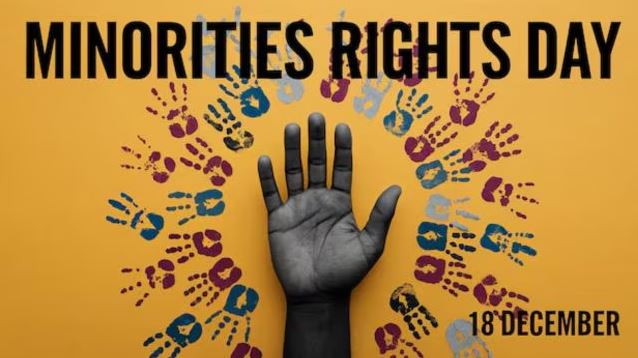
Minorities Rights Day is observed on December 18 every year in India. This day aims to promote awareness about minority rights for various communities. The theme for 2024 is “Promoting Diversity and Protecting Rights.” This theme highlights the importance of inclusivity and equality for all individuals, regardless of their background.
The observance of this day holds significant historical importance. It aligns with the United Nations Declaration on the Rights of Persons Belonging to National or Ethnic, Religious, and Linguistic Minorities. The observance began in India in 2013, emphasizing the need to safeguard minority rights.
In today’s context, minority rights are crucial. They ensure that every citizen enjoys equal opportunities and protection under the law. However, challenges remain. Discrimination, exclusion, and social inequalities persist. This blog explores these issues and suggests holistic changes to protect minority rights in India.
Understanding the Current Challenges to Minority Rights
Minority communities face numerous challenges today. Discrimination is rampant across various sectors. Moreover, reports indicate that minorities often experience social exclusion. According to the National Crime Records Bureau, hate crimes against minorities increased considerably in recent years. In 2023 alone, 32 communal riots were reported.
Economic disparities also exist. A report by the Sachar Committee highlighted that Muslims in India lag behind in education and employment opportunities. Only 6% of Muslims hold government jobs. Clearly, this gap illustrates systemic inequalities that need urgent attention.
Moreover, cultural preservation is at risk. Many minority communities struggle to maintain their unique identities amid a dominant culture. The right to practice one’s religion and preserve cultural heritage is guaranteed by Articles 29 and 30 of the Indian Constitution. Yet, these rights are often overlooked.
As former Prime Minister Manmohan Singh stated, “The true test of our democracy is how we treat our minorities.” Obviously, this quote emphasizes the need for a collective effort towards inclusivity and justice for all citizens.
The Role of the National Commission for Minorities
The National Commission for Minorities (NCM) plays a vital role in safeguarding minority rights in India. Established in 1992, it aims to address grievances and promote welfare among minority communities. However, its effectiveness has been questioned.
Critics argue that the NCM lacks sufficient powers to enforce its recommendations. According to former NCM chairperson Wajahat Habibullah, “The NCM needs more authority to act decisively.” Many feel that its advisory role limits its impact on real change.
Moreover, public awareness about the NCM’s functions remains low. Besides, many minorities are unaware of their rights or how to seek help from the commission. Increasing outreach programs can help bridge this gap.
In addition, a report by Human Rights Watch indicated that “the government failed to properly enforce Supreme Court directives to prevent and investigate mob attacks.” This highlights a significant gap in accountability for protecting minority rights.
Legal Framework: Gaps in Minority Rights Protection
India’s Constitution provides several protections for minorities through various articles. Article 14 ensures equality before the law, while Article 15 prohibits discrimination based on religion or caste. However, implementation remains a challenge.
A significant gap exists in enforcing these laws effectively. For example, despite legal protections, instances of communal violence continue unabated. According to a report by Amnesty International, there were over 50 documented cases of mob violence caused by misinformation during recent years. For instance, establishing special courts for hate crimes can expedite justice for victims. Additionally, training law enforcement on minority rights can improve response times during incidents of discrimination. Besides, there have been numerous instances of human rights violations against people of minority communities.
As Justice Rajendra Mal Lodha said, “Justice must not only be done but must also be seen to be done.” This underscores the need for transparency and accountability in protecting minority rights.
Community Engagement: Mobilizing Support for Minorities
Community engagement is essential for promoting awareness about minority rights. Importantly, grassroots organizations play a crucial role in advocating for change. They can mobilize support and educate communities about their rights.
Successful initiatives have emerged across India that focus on community involvement. For instance, organizations like “Sarva Siksha Abhiyan” work towards educating underprivileged children from minority backgrounds. As a result of their efforts, literacy rates have improved significantly.
Encouraging dialogue between communities can foster understanding and respect. Hosting interfaith events can help break down barriers and promote unity among diverse groups.
As Mahatma Gandhi once said, “An ounce of practice is worth more than tons of preaching.” This quote emphasizes the importance of action over mere words when it comes to community engagement.
Government Initiatives: Assessing Impact
The Indian government has launched various initiatives aimed at empowering minorities. Schemes like “Pradhan Mantri Jan Vikas Karyakram” aim to improve socio-economic conditions for minorities through education and skill development.
However, many of these initiatives lack transparency and accountability. To validate this, a study by the Planning Commission found that only 30% of beneficiaries from minority communities received full benefits from government schemes.
To enhance these initiatives, regular audits should be conducted to ensure funds reach intended recipients. Additionally, involving community leaders in program implementation can increase trust and participation among minorities.
Inculcating Change: Steps Towards Reforms in Minority Rights
To bring about necessary reforms for minority rights in India, several steps must be taken:
- Strengthening Legal Protections: Implement stricter laws against hate crimes.
- Empowering the NCM: Grant more authority to enforce recommendations.
- Increasing Awareness: Launch nationwide campaigns about minority rights.
- Enhancing Government Schemes: Ensure transparency and accountability in welfare programs.
- Fostering Community Dialogue: Encourage interfaith discussions to promote unity.
As Prime Minister Narendra Modi stated in a speech before the US Congress, “For my government, the Constitution is its real holy book.” This statement signifies a commitment to uphold equality as fundamental rights enshrined in India’s Constitution.
Conclusion: A Call to Action
Minorities Rights Day serves as a reminder of our collective responsibility towards marginalized communities in India. Apparently, the challenges faced by minority communities require urgent attention from both the government and society at large.
Holistic changes are essential for effectively protecting minority rights. By strengthening legal frameworks, empowering institutions like the NCM, and fostering community engagement, we can create a more inclusive society.
Let us reflect on our commitment to equality and justice this December 18th. How can you contribute to promoting diversity? Join local initiatives or engage in discussions about minority issues within your community.
Together, we can ensure that every individual feels valued and respected in our diverse nation!

Good blog
Thank you, Manish!
For most people, particularly the NDA, minority means Muslims. There are others like Christians, Sikhs, Buddhists, Jains, Parsis etc. who are also minorities. The NCM is a toothless organization. Nothing much could be expected out of it. A country is truly democratic only when its minorities, women, and lower castes are safe and have a voice.
The present ruling dispensation takes the minorities for granted.
Not only that it arouses phobias in the minds of the majority that the minority is out to snatch the majority’s rights and wealth.
Such perverted leadership is the bane of our country.
Thanks Joseph sir, for stating the obvious. Minority rights has gained in prominence, especially in these times, when awareness is more.